House of Faith runs a transitional housing program for the homeless in Hudson County. Located at 244 Ege Ave, they opened their doors 18 years ago and have run a successful program assisting clients in need with housing and supportive services. In 2017, HUD shifted their focus towards rapid re-housing and House of Faith no longer received funding for their transitional housing program. With the need for housing and supportive services, they now volunteer their services to keep the program alive and operating. They believe in their work and know how many people have succeeded along the way.
When it comes to the mission and passion behind House of Faith, Jennifer Rejfir said it best herself:
We want to ensure that when they leave our doors, they leave with their heads held high, knowing they are moving onto a self-sufficient life, back in control of their future.
Our clients are single, employed over 35 hours a week, alcohol/drug free. They stay in our program from 6-24 months depending on their need. We want them to save up enough funding while staying here so that when they do “graduate” from our program they have enough banked for their first months rent and security and a nest egg in case they lose their employment they don’t fall back into homelessness. We encourage them to save as much as possible while residing here and they are pretty good at that once they receive money management and life skills.
A few months ago, Treehouse Coffee Shop on West Side Ave reached out to me on Instagram and asked me if I could help them get a mural done on the building next door, on a large empty wall that is attached to non-profit organization House of Faith. That is when I learned about this amazing organization, so I reached out to Executive Director Jennifer Rejfir to learn more about them.
Check out this amazing mural painted by Distort and paid for by the awesome community in Jersey City!
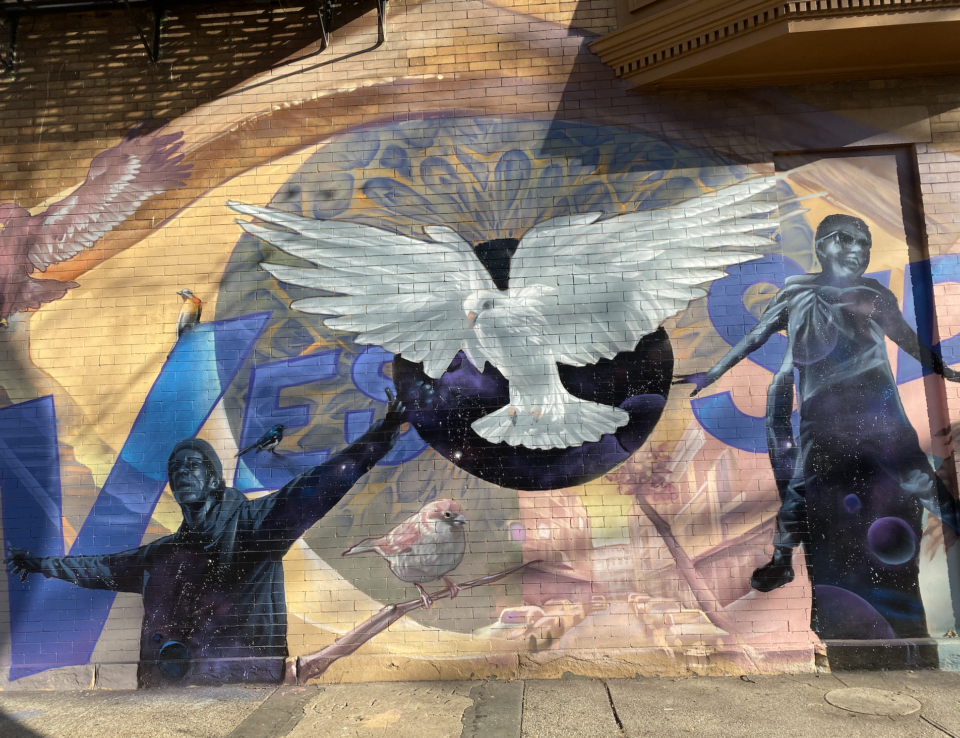
What’s your name?
Jennifer Rejfir.
What do you do?
I am the Executive Director, CFO, everything except case management. We have a Director of Resident Affairs who sits with the clients and gives them all the services they need. I’m more of the financial grant writer and the one they come to when there’s a problem.
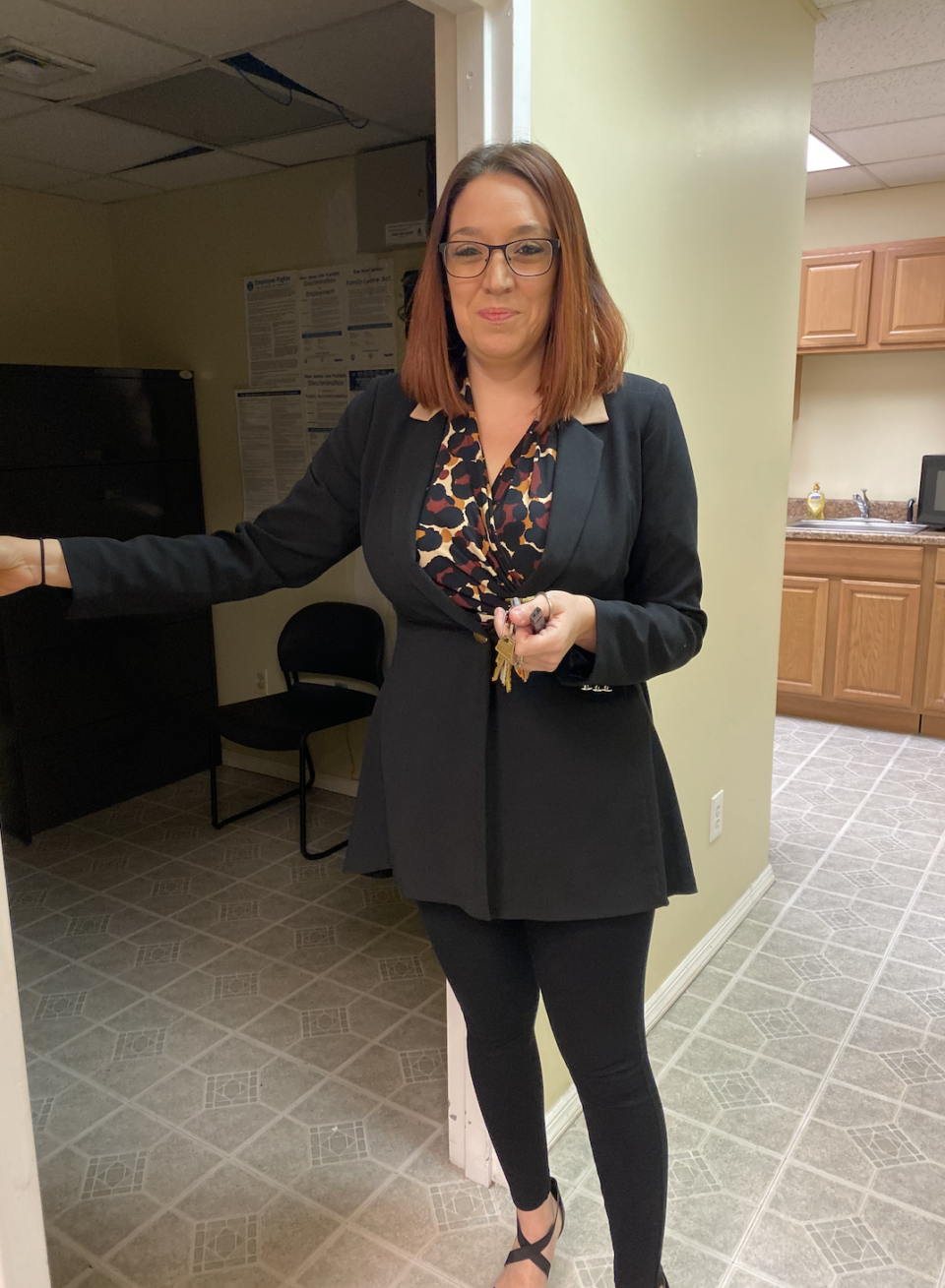
So what’s House of Faith, for anyone who might not know?
We take clients who are currently in a shelter or homeless on the streets who are working more than 35 hours a week. They come into our program through a referral from Garden State Episcopal. As long as they’re working 35+ hours a week and are single, they move into either our transitional housing upstairs or we place them in a rapid re-housing program, which is basically their own apartment and we subsidize a portion of their rent. They stay here for anywhere from 6 to 24 months.
We started the transitional housing program 18 years ago and we were founded by HUD up until 3 years ago. Then they shift focused and wanted to just provide rapid re-housing, they thought it was a better idea. We didn’t want to close House of Faith because we had clients here at the time who were doing really well. Our record of clients not returning to homelessness was great, so our Director of Resident Affairs Renee Riley and I decided to volunteer to keep House of Faith open. About 5 years ago, the City of Jersey City helped us purchase this building through a home grant. We don’t have any leasing that we have to pay out, we just have our operational costs. Clients do pay a program fee, which helps subsidize a portion of the utilities, and then we receive a Hudson County CDBG grant that provides half of the utility costs, the insurances, and everyday functions here but there’s no paid staff to run this building. For the rapid re-housing program, we receive a grant from HUD. We used to receive money for education, food, bus cards, things like that. Now we’re more hands-on with trying to provide the services we used to provide. We don’t have money for educational costs anymore, if they want to go for their CDL licenses or anything like that. We try to write for grants. We do receive about $15K a year from a foundation, which we try to use for the costs for services we used to provide, but it’s tight. Very tight. It’s also a lot of work. We had to get rid of our whole staff when we changed grants. We used to have this building occupied for 24 hours, somebody was always here making sure everybody was safe in the building – drug testing them, breathalyzing them – and we don’t have that anymore. It’s very rough, but we love what we do.
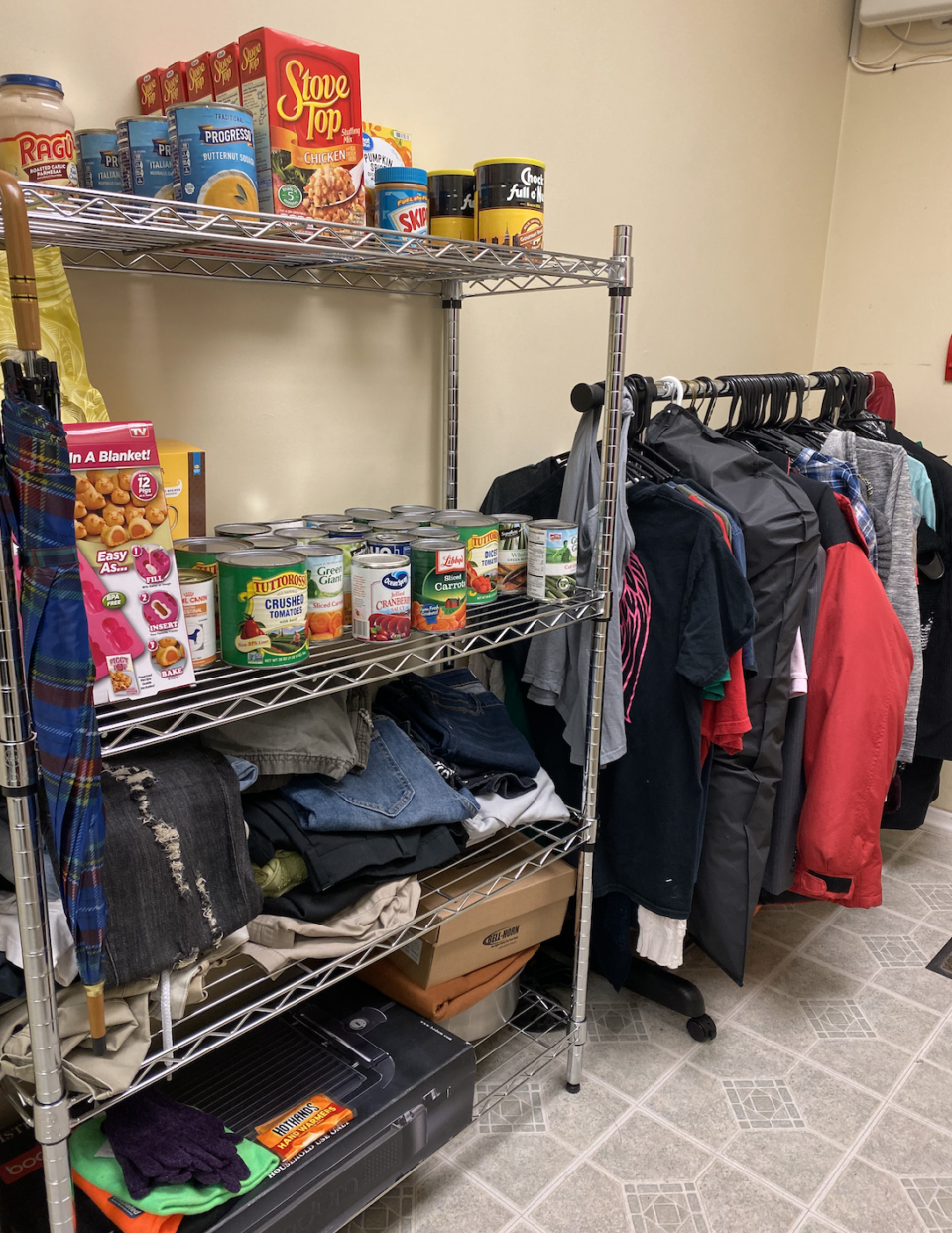
Let’s talk about the housing issues in Jersey City. How do you feel it’s been in the last couple of years? Has it gotten worse, is it getting better? What’s available out there?
The rents in Jersey City are only increasing. They’re building more buildings and they’re a lot more money per month than a regular average two-family home would be. One of the issues we had when we started to receive the rapid re-housing grant money was talking to the landlords and telling them, “We have these clients; yes, it’s guaranteed money that we will pay out while they’re staying here,” but the clients themselves are the ones that have to sign that lease agreement. If somebody has past convictions, bad credit, or past evictions, it’s hard to get these landlords to trust in you and believe in your program. Our Director of Resident Affairs is amazing at it and made a lot of connections, but it took a while to do that.
It’d be great if we had more affordable housing. I know they’re putting it out, but it seems like everything’s in the works and not there yet. It’s very difficult to find these apartments for our clients, and we want to be able to use the money we do receive because if you don’t use it, you lose it.
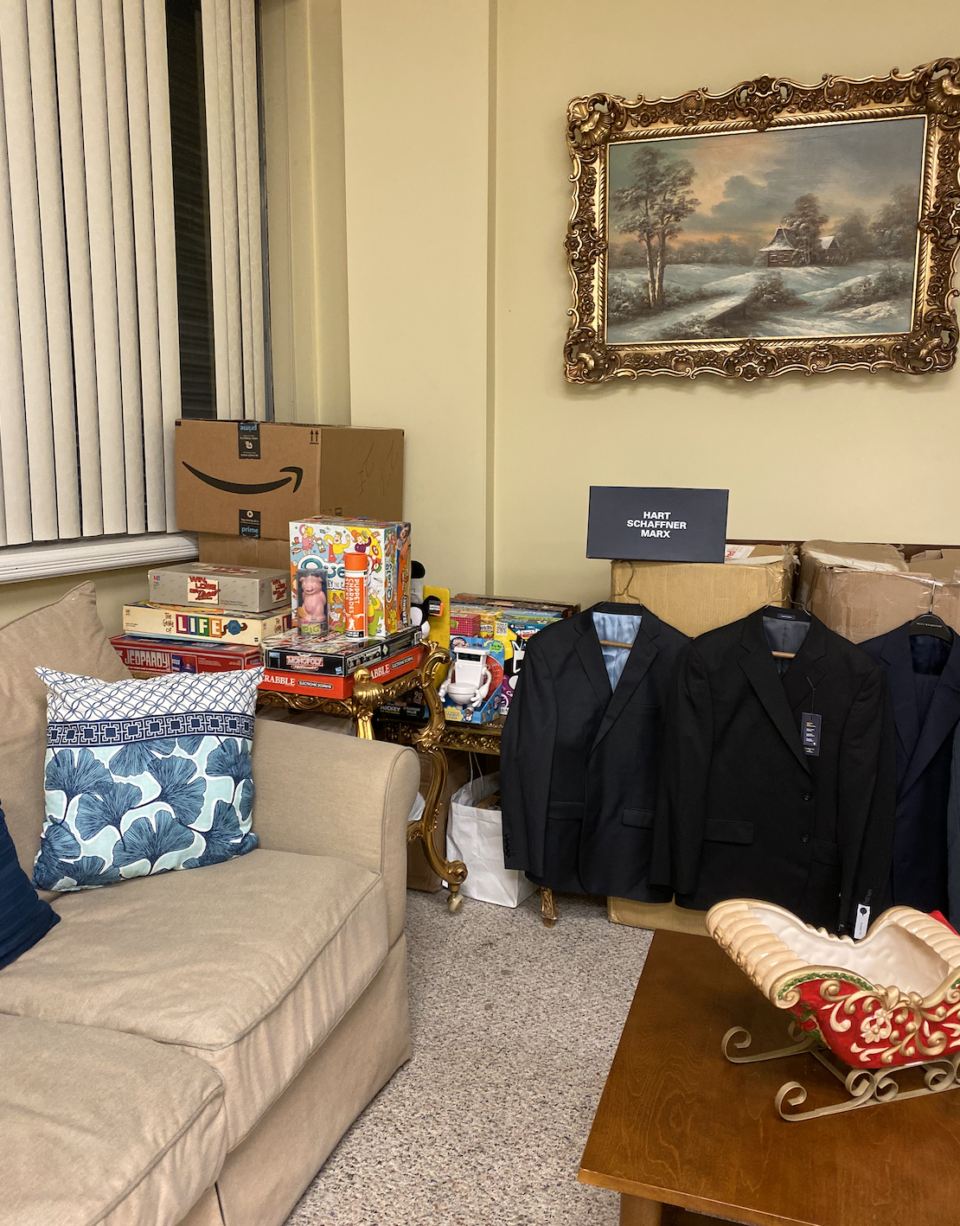
How many apartments do you currently have?
Upstairs in the transitional housing, we have four. Some are two-bedroom, some are three-bedroom. We have ten clients here in total.
If clients come in and are working 35 hours a week but they’re making minimum wage, we work on their resumes once they come here and try to find them a higher paying job. The whole point is, save your money while you’re here so you have this nest egg when you move out. When we first started, we were able to match anything they saved up to $3,000. If they saved $3,000, they walked out with $6,000. Then the federal funding depleted and we weren’t able to do that anymore.
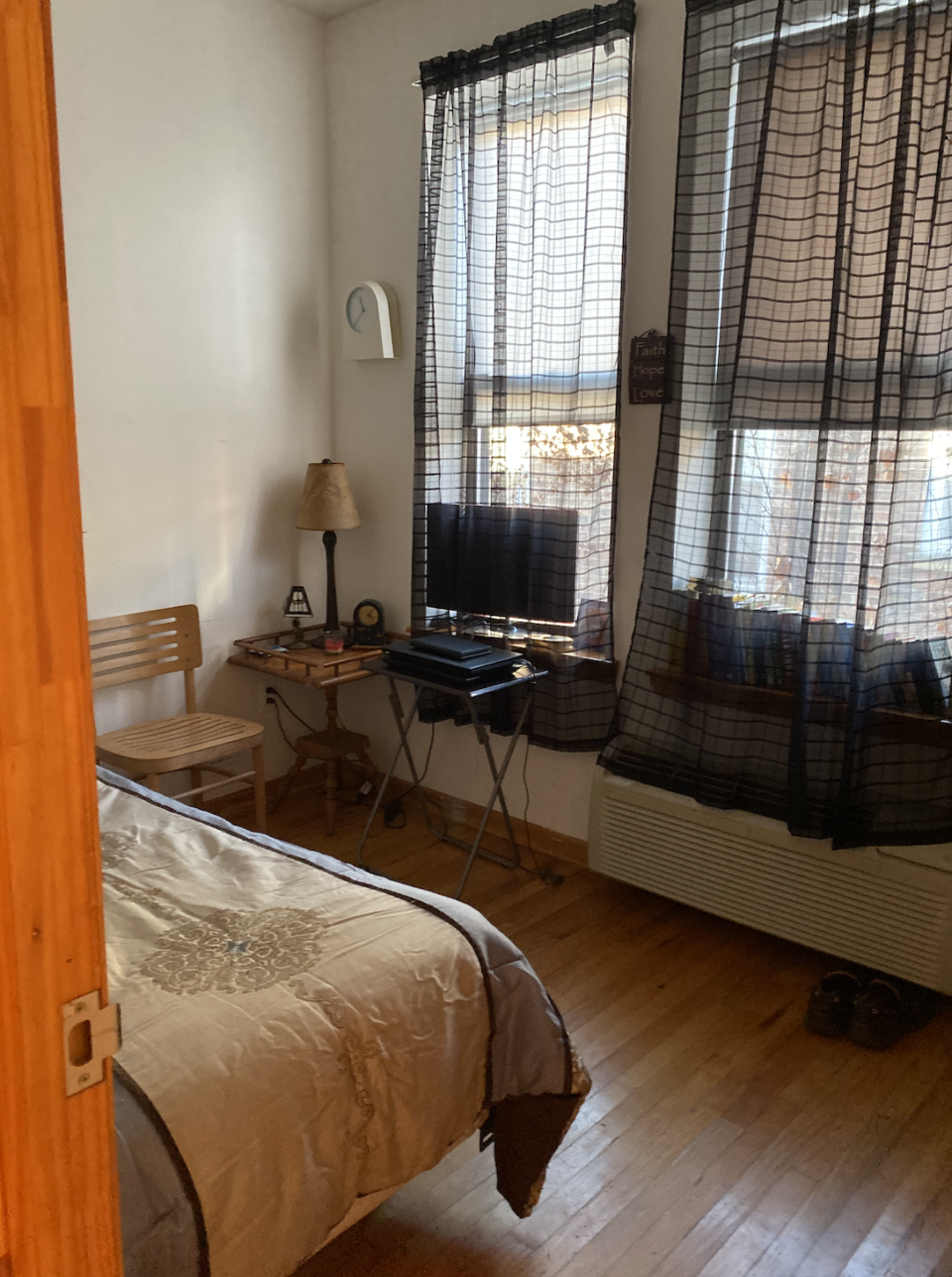
What is your biggest challenge, other than money?
The biggest challenge is the lack of staff. It’s more like when we first started out. My aunt started this organization years ago as a Sisters of Charity nun. I’ve worked with the homeless population since I was ten years old, feeding them down at Hoboken shelter, so it was almost in our blood to do this. It was more hands-on back then. Now, it feels like I’m losing that since we’re scrounging for money and trying to do fundraisers.
How can people help? I’m sure there’s a lot of people who want to help, but don’t know where to start.
Yeah, some people don’t know we’re here. When we started, the neighborhood must’ve found out that we planned on moving here. This building just had squatters in it, basically, so we received a grant from DCA to refurbish the second and third floor. When the neighbors found out we were moving in, they took us to court. It took us a couple of years to fight to get in here. At the time, they said they didn’t want us advertising. They thought we were going to be more of a shelter, with people hanging out outside. Once we moved in, the neighbors would come over and say, “Oh I feel so safe now getting off the bus, there’s always somebody outside sweeping or smoking a cigarette and they say ‘good morning’ to me.” or “If I’m leaving early in the morning, I feel safer knowing that there’s somebody out there.”
Now with the mural, it gives people something to talk about and they love it, and then they learn about our building. We’re in here, but nobody really knows we’re here.
They will now! So other than money and items, what else would you need?
We need volunteers. We actually need two apartments painted. I know there’s an agency that we’re currently on a wait list for, like big corporations will contact Home Depot or Lowe’s and they’ll supply the paint or bring volunteers in.
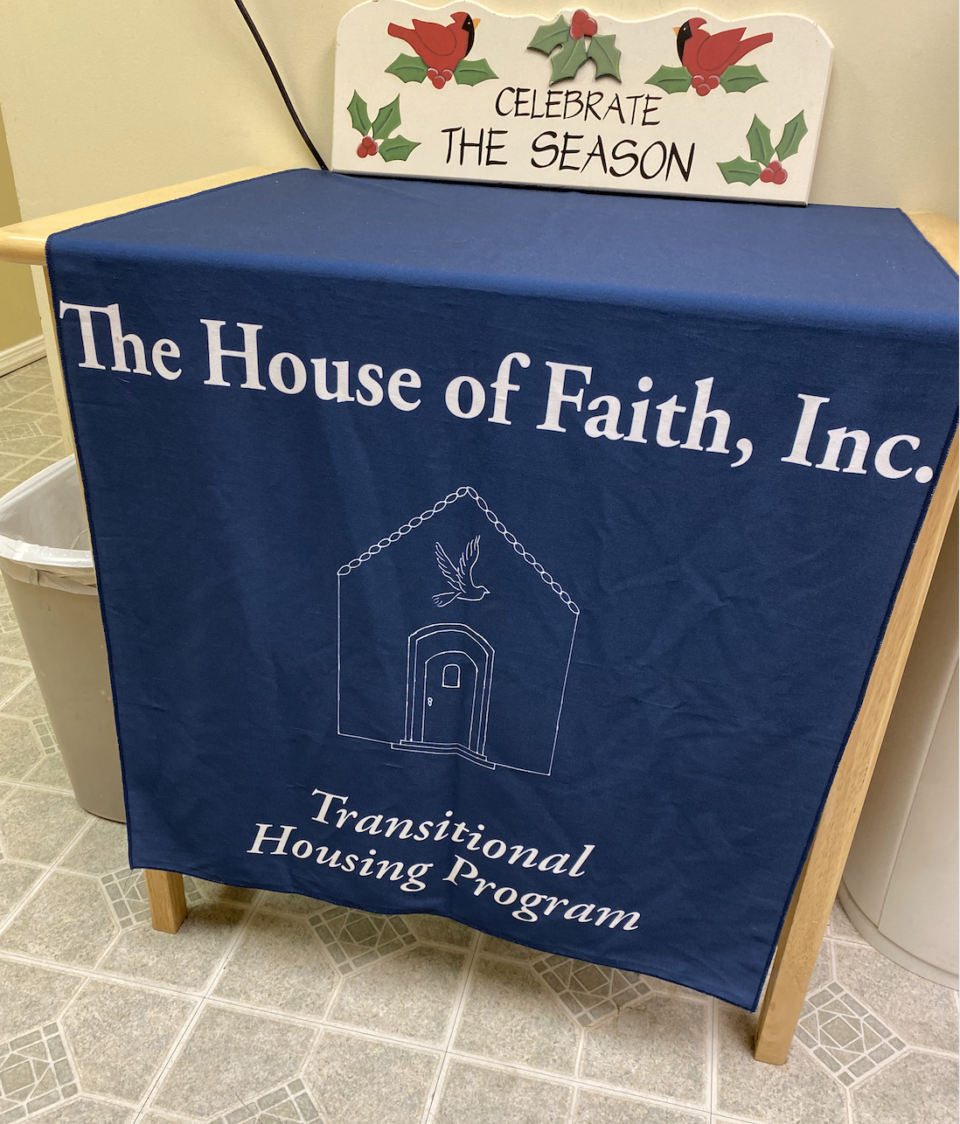
Let’s help! How many rooms is it?
There’s two apartments and maybe the hallways. They don’t need to be professional painters, just any volunteers. We’d also need some furniture for apartments.
You should definitely put together an Amazon wishlist! People can buy stuff and send it.
We do have a canned food drive where people can drop off food year-round at Daily Grind on 352 West Side Ave.
Is there anything else you need?
We’re good with clothes, we recently received donations by Men’s Wearhouse and other items from people we know. Since we lost that grant, we don’t have money to upgrade what we have. For instance, the carpet in the hallway needs to be redone. We just got a grant from Hudson County to put in a new heating system. The heat down here works right now, but if it gets to 50 or 40, the whole outside unit freezes and then there’s no heat in here.
Is there anything else you want people to know about House of Faith?
The whole stigma around homelessness. Recently, I was on Facebook and there was a post where people complained about the showers Mayor Fulop put in the Square, which I think is great for people to take a shower or even change their clothes, just feel better about themselves. They were talking about people leaving water bottles full of urine on a park bench on Central Ave, and some people were writing in, “Would you rather them just go right on the street?” This stigma around homelessness is every person that’s homeless is either addicted to drugs or struggles with mental health, alcohol… The guys who come to us are regular guys who are holding down jobs but, for whatever reason, need a helping hand and need someone to listen to them or steer them in the right direction. They’re already working when they come to us, they just need someone to believe in them.
Do you get mostly men?
We do have mostly men. In the beginning, we had mostly women but I feel like there are a lot more resources for women and families out there – York Street Project, St Joseph’s Home, Hope House – but there aren’t many agencies in Hudson County that help single working men other than the shelters and Salvation Army. It’s just crappy, the way people automatically judge them. With the way we live in America, we’re all only a paycheck away from becoming homeless in America. These guys are working 10 hour days making minimum wage. Where are you going to live in New Jersey and be able to pay first month’s rent and a security deposit?
They say to live in Jersey City, you need to be making $20 an hour or more, which is absurd.
Even with the $15 minimum wage rate we’re working toward, you have to think of the taxes and cost of living. When we first started, we were able to give them their bus fare every month and it was one less expense. Most people are taking 2-3 buses just to get to work. We’d also provide food cards for them.
How do they find you?
We get referrals from Garden State Episcopal. We used to be able to go to the shelters and they would send us people who they knew were working.
Is there a long waitlist?
There isn’t much of a crazy waitlist. There are a lot of homeless providers in Hudson County. With us, they have to be working over 35 hours a week. If a client goes down to St Lucy’s and then goes to Garden State, if they’re not working at that time and then start a job a month later, I don’t know if they’ll tell them “Hey, I qualify for House of Faith.” When we first started, we had staff that worked down at St Lucy’s to help with the process. Now, it’s a little different.
If you would like to help, check out their Amazon Wish List.
You must be logged in to post a comment.